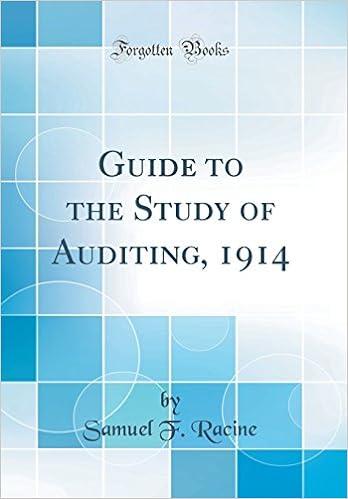Question
Sheffield Corp. has 149,910 shares of common stock outstanding. In 2020, the company reports income from continuing operations before income tax of $1,221,100. Additional transactions
Sheffield Corp. has 149,910 shares of common stock outstanding. In 2020, the company reports income from continuing operations before income tax of $1,221,100. Additional transactions not considered in the $1,221,100 are as follows.
| 1. | In 2020, Sheffield Corp. sold equipment for $36,200. The machine had originally cost $81,900 and had accumulated depreciation of $34,800. The gain or loss is considered non-recurring. | |
| 2. | The company discontinued operations of one of its subsidiaries during the current year at a loss of $196,200 before taxes. Assume that this transaction meets the criteria for discontinued operations. The loss from operations of the discontinued subsidiary was $92,300 before taxes; the loss from disposal of the subsidiary was $103,900 before taxes. | |
| 3. | An internal audit discovered that amortization of intangible assets was understated by $39,200 (net of tax) in a prior period. The amount was charged against retained earnings. | |
| 4. | The company recorded a non-recurring gain of $125,500 on the condemnation of some of its property (included in the $1,221,100). |
Analyze the above information and prepare an income statement for the year 2020, starting with income from continuing operations before income tax. Compute earnings per share as it should be shown on the face of the income statement. (Assume a total effective tax rate of 19% on all items, unless otherwise indicated.) (Round earnings per share to 2 decimal places, e.g. 1.47.)
| SHEFFIELD CORP. Income Statement (Partial) December 31, 2020For the Year Ended December 31, 2020For the Quarter Ended December 31, 2020 | |||
| Income TaxDiscontinued OperationsDividendsEarnings Per ShareExpensesGain on CondemnationIncome From Continuing OperationsIncome From Continuing Operations Before Income TaxNet Income / (Loss)Retained Earnings, January 1Retained Earnings, December 31RevenuesLoss from Disposal of SubsidiaryLoss from Operations of Discontinued Subsidiary | $ | ||
| Income TaxDiscontinued OperationsDividendsEarnings Per ShareExpensesGain on CondemnationIncome From Continuing OperationsIncome From Continuing Operations Before Income TaxNet Income / (Loss)Retained Earnings, January 1Retained Earnings, December 31RevenuesLoss from Disposal of SubsidiaryLoss from Operations of Discontinued Subsidiary | |||
| Income TaxDiscontinued OperationsDividendsEarnings Per ShareExpensesGain on CondemnationIncome From Continuing OperationsIncome From Continuing Operations Before Income TaxNet Income / (Loss)Retained Earnings, January 1Retained Earnings, December 31RevenuesLoss from Disposal of SubsidiaryLoss from Operations of Discontinued Subsidiary | |||
| Income TaxDiscontinued OperationsDividendsEarnings Per ShareExpensesGain on CondemnationIncome From Continuing OperationsIncome From Continuing Operations Before Income TaxNet Income / (Loss)Retained Earnings, January 1Retained Earnings, December 31RevenuesLoss from Disposal of SubsidiaryLoss from Operations of Discontinued Subsidiary | |||
| Income Tax Discontinued Operations Dividends Earnings Per Share Expenses Gain on Condemnation Income From Continuing Operations Income From Continuing Operations Before Income Tax Net Income / (Loss) Retained Earnings, January 1 Retained Earnings, December 31 Revenues Loss from Disposal of Subsidiary Loss from Operations of Discontinued Subsidiary | $ | ||
| Add Less :Applicable Income Tax ReductionDiscontinued OperationsDividendsEarnings Per ShareExpensesGain on CondemnationIncome From Continuing OperationsIncome From Continuing Operations Before Income TaxNet Income / (Loss)Retained Earnings, January 1Retained Earnings, December 31RevenuesLoss from Disposal of SubsidiaryLoss from Operations of Discontinued Subsidiary | $ | ||
| Income Tax Discontinued Operations Dividends Earnings Per Share Expenses Gain on Condemnation Income From Continuing Operations Income From Continuing Operations Before Income Tax Net Income / (Loss) Retained Earnings, January 1 Retained Earnings, December 31 Revenues Loss from Disposal of Subsidiary Loss from Operations of Discontinued Subsidiary | |||
| Add Less :Applicable Income Tax ReductionDiscontinued OperationsDividendsEarnings Per ShareExpensesGain on CondemnationIncome From Continuing OperationsIncome From Continuing Operations Before Income TaxNet Income / (Loss)Retained Earnings, January 1Retained Earnings, December 31RevenuesLoss from Disposal of SubsidiaryLoss from Operations of Discontinued Subsidiary | |||
| Income TaxDiscontinued OperationsDividendsEarnings Per ShareExpensesGain on CondemnationIncome From Continuing OperationsIncome From Continuing Operations Before Income TaxNet Income / (Loss)Retained Earnings, January 1Retained Earnings, December 31RevenuesLoss from Disposal of SubsidiaryLoss from Operations of Discontinued Subsidiary | $ | ||
| Income TaxDiscontinued Operations, Net of TaxDividendsEarnings Per ShareExpensesGain on CondemnationIncome From Continuing OperationsIncome From Continuing Operations Before Income TaxNet Income / (Loss)Retained Earnings, January 1Retained Earnings, December 31RevenuesLoss from Disposal of SubsidiaryLoss from Operations of Discontinued Subsidiary : | |||
| Income Tax Discontinued Operations, Net of Tax Dividends Earnings Per Share Expenses Gain on Condemnation Income From Continuing Operations Income From Continuing Operations Before Income Tax Net Income / (Loss) Retained Earnings, January 1 Retained Earnings, December 31 Revenues Loss from Disposal of Subsidiary Loss from Operations of Discontinued Subsidiary | $ | ||
| Income Tax Discontinued Operations, Net of Tax Dividends Earnings Per Share Expenses Gain on Condemnation Income From Continuing Operations Income From Continuing Operations Before Income Tax Net Income / (Loss) Retained Earnings, January 1 Retained Earnings, December 31 Revenues Loss from Disposal of Subsidiary Loss from Operations of Discontinued Subsidiary | |||
| Income Tax Discontinued Operations, Net of Tax Dividends Earnings Per Share Expenses Gain on Condemnation Income From Continuing Operations Income From Continuing Operations Before Income Tax Net Income / (Loss) Retained Earnings, January 1 Retained Earnings, December 31 Revenues Loss from Disposal of Subsidiary Loss from Operations of Discontinued Subsidiary | $ | ||
Step by Step Solution
There are 3 Steps involved in it
Step: 1

Get Instant Access to Expert-Tailored Solutions
See step-by-step solutions with expert insights and AI powered tools for academic success
Step: 2

Step: 3

Ace Your Homework with AI
Get the answers you need in no time with our AI-driven, step-by-step assistance
Get Started


